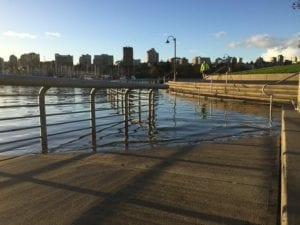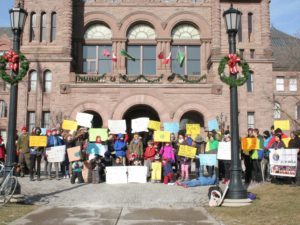by Caterina Lindman, CCL Leader Waterloo I had first heard about Greta’s climate strike a few months before the COP meeting in December, from Cathy Orlando, when she revealed that her daughter, Sophia Mathur, would be striking from school in Sudbury. I found the idea interesting, but it did not light a spark at that point. I didn’t know any youth that would feel so strongly about climate change that they would embark on a strike. One of the reasons that Citizens’ Climate Lobby appealed to me was that rather than standing outside the halls of power with a sign, the approach was to build relationships with your members of Parliament, and of going in with a briefcase and having dialogues. I also liked the idea of building relationships with local media and of writing Letters to the Editor and op-eds as a way of building political will with the public. But then I watched Greta Thunberg tell her story on Democracy Now! (Part 1 and Part 2). I was very moved by her story. She explains how she learned about climate change, how she came to the point of striking for the climate, and the actions she has taken to reduce her carbon footprint. It’s interesting that she came to a point where she did not eat or speak, because of her despair. Her parents then paid attention and did what they could to help Greta. One of the ways that they could show their love and concern was by reducing their own environmental impact. Slowly, Greta realized that she could do something about the climate and she decided to do so, which included striking from school. It led me to ponder the use of fasting as a way to clarify one’s vision and life purpose. Jesus fasted before entering his Ministry, and vision quests, which include fasting, are a part of Native spirituality. I think that Greta came to the inescapable conclusion through her fasting and silence, that we as a society, and adults, in particular, were not acting with enough resolve and urgency about the unraveling of our climate system. This led her to strike from school and speak with eloquence and power to the world. Having strikes in our local area is a way to amplify Greta’s message and to exercise our own power in showing how urgent it is to avert climate collapse. If we don’t act with urgency, the world will suffer immensely due to ocean acidification, sea level rise, more droughts and storms, and wildfires. We need to restructure our economies and society to live within sustainable ecological limits, and we seem to be unable to grasp the urgency of the crisis. Luckily, I work with other groups on climate action in Waterloo Region, such as Climate Save, Rise WR, and People’s Climate March. So a number of activists got together to organize the strike, and together, we reached out to some students, and we supported them. The first students to get involved were vegans, which meant that they already had the experience of acting in accordance with their values, despite a culture that displayed different values. Through working with Citizens’ Climate Lobby, I had developed a relationship with Luisa D’Amato, from the Waterloo Region Record. As well as sending her the Press Release, I phoned her and asked her to come to the strike. She came, and interviewed the three high school students that were there, and wrote this opinion piece. I was really happy that she was interested in listening to the students, and I liked how she tied the students’ strike back to Greta’s story. All in all, participating in the strike is a good experience. It stretched me beyond my comfort zone, and it led me to forge new relationships as we build political will for a liveable planet. Yes, a strike is disruptive, and it involves sacrifice, but the times are calling for it! ————————– Do you want to get to know Caterina better? Read the Volunteer Spotlight about her here. Organizing a Climate Strike
BLOG: Organizing a climate strike by Caterina Lindman
Home » CCL Canada News » BLOG: Organizing a climate strike by Caterina Lindman






